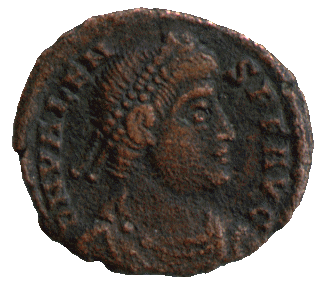 Contents -
Previous Article -
Next Article
Contents -
Previous Article -
Next Article
Valens was the brother of the Roman emperor Valentinian the First. Valentinian had been elevated to the throne as a result of the efforts of the Roman Army legions. As part of the arrangements for placing Valentinian on the throne, the soldiers insisted that he appoint a co-emperor to help him rule the vast Roman Empire. Accordingly, Valentinian chose to govern the West and appointed his brother Valens as colleague and Emperor of the East.
Valens believed in a variation of Christianity called Arianism. Named after Arius, the priest who founded it, Arianism was considered heresy by the Catholics, who were the main organized Christian group of the day. The Catholic Church was quite powerful in Roman politics by the time of Valens, and consequently he did not gain their support. The main difference between Catholics and Arians was the nature of Jesus Christ. The Catholics held that God comprised the Holy Trinity of Father, Son (Jesus), and Holy Ghost. The Arians believed that Jesus was, although divine, still subservient and of lesser importance than the Father, whereas the Catholics taught that all three persons in the Trinity were in fact God and equal with one another. The majority of Goths kept faith with the Arian religion and the emperor Valens had many Gothic troops in his army at this time. The issue of "foreign" troops who held to a different kind of Christianity than than Romans serving in Roman armies was to boil over twenty years later in the reign of Honorius in a treacherous murder of the families of Gothic soldiers.
In A. D. 375, the Ostrogoths under Fritigern had asked to be allowed to settle within the Roman Empire. Now, three years later, thy were in armed rebellion and had sacked and burned towns and villas in the countryside around the city of Adrianople. The situation had become serious enough for the emperor Valens himself to lead an army to deal with it. In the meantime, Valens had sent to his nephew, the western emperor Gratian for reinforcements.
On the afternoon of August 9, A. D. 378, the cocky Emperor Valens was defeated, along with his army after having proceeded to attack the Visigoths and Ostrogoths at Adrianople without waiting for the troops that his nephew Gratian was bringing to reinforce him. He should have taken the extra time to wait for reinforcements and not tried to keep all the glory of victory for himself. Disorganized barbarian warriors, no matter how many there were nor how strong and fierce each individual was, were no match for disciplined Roman legionaries who had drilled and trained in the techniques of orderly combat. These stalwart Roman soldiers, through their years of training and competent, professional leadership, had been winning pitched battles even though outnumbered ever since the days of Hannibal. Emperor Valens' arrogance and pride allowed him to be deceived by a cheap trick that a more prudent man would have anticipated. The barbarian leader, Fritigern, had delayed the battle with phony peace talks until the Gothic cavalry had returned from raiding the countryside. Barbarian troops had set smoky grass fires, adding to the discomfort of the Roman troops. After having marched and stood in the hot sun all day long, the Roman troops, along with their emperor, were tired. They were slaughtered by the Gothic warriors while the mounted cavalry herded them together.. Two-thirds of the Roman army of the East was destroyed on that long summer afternoon in a battle that lasted until well after dark. Emperor Valens' body was never found.
The most reliable record we have of those times was written down by the late Roman historian Ammianus Marcellinus. According to Ammianus, there are two different accounts of how the emperor died. One account has him making a heroic last stand surrounded by a few of his strongest, most faithful legionary warriors, and the other tells of his death in the second story of a farmhouse. Evidently, Valens decided to retreat there with a few remaining warriors. Visigothic demands for surrender were answered with a shower of Roman arrows. The barbarian troops then set fire to the dwelling, and Valens perished in the flames. There is no indication that Valens was lacking in personal bravery, but his impulsiveness caused him to sacrifice the greatest army in the world of his day.
Go to next article on Gratian
Go back to previous article on Valentinian I